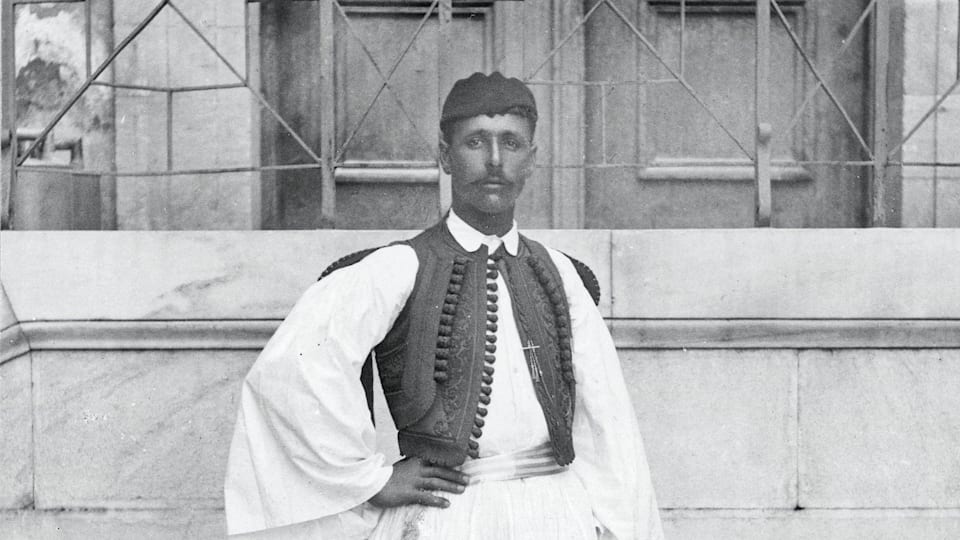Local hero Spyridon Louis earns cult status in marathon
One of the undoubted highlights of the 1896 Olympics was the first-ever marathon. Conceived by Frenchman Michel Bréal, the race followed the legendary route of Pheidippides, a trained runner who was believed to have been sent from the plain of Marathon to Athens to announce the defeat of an invading Persian army in 490BC. The race, on 10 April, became a highlight of the inaugural Games. And the fact that it was won by Spyridon Louis, a Greek, produced a euphoric reaction in the host country.

“It is no exaggeration to say that the whole nation had set its heart on carrying away the prize offered by Monsieur Michel Breal, the French academician, in memory of the famous Athenian courier who ran from Marathon to the city to announce the defeat of the Persians and fell dead on his arrival.
Greek competitors at the inaugural Games accounted for 230 of the 313 total, but it was the marathon that they wanted to win more than any other event. And they got their wishes, with Greeks occupying all of the top three places, going a huge way to atoning for their disappointments in other events.
Qualifying races for would-be Greek participants were organised by an army colonel, Papadiamantopoulos, who had been Louis' commanding officer during his military service. Louis had gained a reputation for impressive stamina and speed during manoeuvres and was persuaded to enter the second qualifying race. Despite finishing just fifth behind winner Dimitrios Deligiannis but fast enough to make it into the Olympic race.
The 23-year-old Louis, a water carrier for his father’s mineral water shop, took the lead four kilometres from the finish line, crossing it more than seven minutes ahead of his nearest rival, much to the joy of the 100,000 spectators.
Seventeen athletes – 13 from Greece and four from other countries – set off from a small field in Marathon. The early leader was the Frenchman Albin Lermusiaux, who had earlier placed third in the final of the 1,500 metres, but he tired after 32km and had to pull out of the race. The frontrunning was taken over by Edwin Flack, the Australian winner of the 800m and 1,500m. But Louis slowly closed him down and, Flack eventually collapsed exhausted, enabling Louis to take the lead.
In the stadium, the atmosphere was tense, especially after a cyclist delivered the news that the Australian was out front. However, when Louis moved into the lead, the police dispatched another messenger to spread that word that a Greek was now in front, and shouts of "Hellene, Hellene!" (“Greece, Greece!”) rang out around the crowds. When Louis finally arrived in the stadium, the spectators erupted with joy. Two Greek princes – Crown Prince Constantine and Prince George – rushed to meet him and accompanied him on his final lap, as he clocked a finishing time of 2 hours 58 minutes 50 seconds.
That hour was something unimaginable and it still appears to me in my memory like a dream… Twigs and flowers were raining down on me. Everybody was calling out my name and throwing their hats in the air… Spyridon Louis Greece - Spyridon Louis Greece
A national hero overnight
Louis was transformed into a national hero overnight. All of the next day’s papers were full of his exploits, publishing an account of his life and his portrait. Some shops even went so far as to adopt his name as a marketing ploy. The victorious Louis himself was overwhelmed by the attention he was now receiving.
The result was quickly telegraphed to all of the main towns in Greece, prompting ‘demonstrations’ in honour of the victor across the country. Telegrams of congratulation came from every part of the world, as did a plethora of gifts, ranging from an antique vase to free shaves for life at an Athenian barber shop. Some Greek expats in England even presented him with a field, which was renamed the Field of Marathon in his honour.
Reportedly, the King of Greece offered Louis any gift he would care to ask of him, and all Louis could think of was a donkey-drawn carriage to help him in his water-carrying business. He retreated to his hometown, never again competing in running. He lived a quiet life, working as a farmer, and later as a local police officer.
Flagbearer in Berlin 40 years later
In 1936 he was chosen to be the flagbearer for the Greek delegation at the Olympic Games in Berlin, where he recalled his exploits of four decades earlier. "That hour was something unimaginable and it still appears to me in my memory like a dream… Twigs and flowers were raining down on me. Everybody was calling out my name and throwing their hats in the air…”
He died four years later, at the age of 67. However his spirit lives on, with many sports clubs in Greece and abroad still carrying his name, as does the main stadium at the Athens Olympic Sports Complex, which served as the main venue for the 2004 Summer Olympics. And his name has even become embedded in the Greek language, through the expression "yinomai Louis" (γίνομαι Λούης), literally "to becοme Louis," which means "tο disappear rapidly out of sight”.
